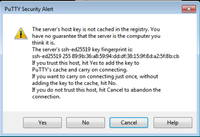CRSP
From ISOR
(Difference between revisions)
(→access) |
(→access) |
||
| Line 17: | Line 17: | ||
<li> Establish a Virtual Private Network (VPN) to Uni if working from home or if you cannot establish an SSH connection ([https://zid.univie.ac.at/en/vpn/ see ZID/VPN]). You wouldn't have to use VPN if working from the institute's PC-labor #6.644. | <li> Establish a Virtual Private Network (VPN) to Uni if working from home or if you cannot establish an SSH connection ([https://zid.univie.ac.at/en/vpn/ see ZID/VPN]). You wouldn't have to use VPN if working from the institute's PC-labor #6.644. | ||
</li> | </li> | ||
| − | <li> If working from Windows, you might need to install an SSH-client [https://www.putty.org/ like PUTTY]) to use Secure Shell (SSH) to connect to your terminal. | + | <li> If working from Windows, you might need to install an SSH-client [https://www.putty.org/ like PUTTY]) to use Secure Shell (SSH) to connect to your terminal. Accept the server key. |
| − | + | [[File:3_accept_key.png||frameless|200px|caption]] | |
</li> | </li> | ||
<li> | <li> | ||
| − | now you work remotely and use the remote host's command line (which is the bash shell, don't type the beginning "$", which is the prompt): | + | [[File:4_terminal_session.png||frameless|200px|caption]]now you work remotely and use the remote host's command line (which is the bash shell, don't type the beginning "$", which is the prompt): |
<ol> | <ol> | ||
<li> the midnight-commander (mc) provides an built-in editor mcedit (exit it with Alt+0) | <li> the midnight-commander (mc) provides an built-in editor mcedit (exit it with Alt+0) | ||
Revision as of 13:55, 22 October 2019
1 CRSP, COMPUSTAT, CCM
1.1 access
- email the VDC sysadmin to provide credentials and prepare your remote terminal
- host: crsp.vdc.univie.ac.at
- user: your username
- password: your password
- Establish a Virtual Private Network (VPN) to Uni if working from home or if you cannot establish an SSH connection (see ZID/VPN). You wouldn't have to use VPN if working from the institute's PC-labor #6.644.
- If working from Windows, you might need to install an SSH-client like PUTTY) to use Secure Shell (SSH) to connect to your terminal. Accept the server key.

-
 now you work remotely and use the remote host's command line (which is the bash shell, don't type the beginning "$", which is the prompt):
now you work remotely and use the remote host's command line (which is the bash shell, don't type the beginning "$", which is the prompt):
- the midnight-commander (mc) provides an built-in editor mcedit (exit it with Alt+0)
$ mc
$ mcedit ts_samp7.rqt
-
e.g. use "ts_print" to process a requirementfile "ts_samp7.rqt" and get the output "ts_samp7.out":
$ ts_print ts_samp7.rqt
look into ts_samp7.out with:
$ cat ts_samp7.out
-
use e.g. this command to get the switches for the command crsp_print:
$ crsp_print /d1 /var/crsp/2019-07/crspdata/cmz201807
- the midnight-commander (mc) provides an built-in editor mcedit (exit it with Alt+0)
- use an SFTP client like CyberDuck to download the results of your terminal session onto your desktop for further processing
- Please read some manuals to gain experience with the ts_sampleX.rqt files in your home directory: CRSP Utilities and Program Libraries (CUPL) and maybe the xf-understanding_the_data guide.